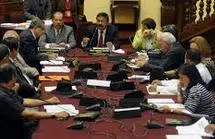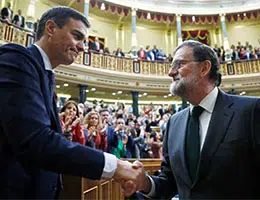 The idea of motion comes from the Latin word motio . The first meaning mentioned in the dictionary of the Royal Spanish Academy ( RAE ) refers to the act and the result of being moved or of moving . The term can also be used with reference to an agitation of the spirit .
The idea of motion comes from the Latin word motio . The first meaning mentioned in the dictionary of the Royal Spanish Academy ( RAE ) refers to the act and the result of being moved or of moving . The term can also be used with reference to an agitation of the spirit .
The most common use of the concept today, however, is linked to a proposal that is presented in an organization that has the function of deliberating. It is an initiative or a project that is submitted to a vote or decision by an authority.
A parliamentary motion , in this framework, allows parliament to express its position on certain events. Common in parliamentary systems, this may be a motion of protest , a motion of interpellation , a point of order , a motion of repudiation or a motion of censure , for example.
A point of order in some type of assembly, for example, aims to seek the intervention of its president during the development of a debate . Points of order can be linked to compliance with formal procedures, the characteristics of the speeches or their duration.
In some presidential systems, meanwhile, a motion is a bill presented by the legislators themselves. In this way the motion differs from the message , which is a project promoted by the highest president.
The procedure known as a motion of censure is used by parties represented in the Lower House or in a unicameral parliament to be able to demand political responsibility from their executive branch. In Spain, for example, it can also be carried out at the autonomous and municipal level. The Lower House is one of the two bodies that are part of a bicameral system; Both its functions and its composition vary from one country to another.
The motion of censure is very important and common in parliamentary systems, where it is the parliament itself that elects the president or the prime minister, since through this procedure they can also get him replaced. In any case, it can also be done in a non-parliamentary system, although in a presidential system the president cannot be removed but only some minister of the executive Cabinet .
 It is important not to confuse the motion of censure with the impeachment trial , the only legal path that presidential systems usually have to achieve the removal of the President of the Republic. While the reason behind the first to demand the prime minister or the president and ask for their replacement is the lack of parliamentary support, the impeachment focuses on the crimes that the president has committed.
It is important not to confuse the motion of censure with the impeachment trial , the only legal path that presidential systems usually have to achieve the removal of the President of the Republic. While the reason behind the first to demand the prime minister or the president and ask for their replacement is the lack of parliamentary support, the impeachment focuses on the crimes that the president has committed.
On the other hand, there is the motion of confidence , a political instrument that the prime minister or president of the Government has at his disposal to confront a situation of weakness and thus ask Parliament for its support for a specific program or policy. The loss of a vote of confidence is usually followed by the resignation of the president and general elections.
The interpellation motion consists of certain members of the legislative branch interrogating one of the Cabinet or Parliament of Ministers regarding a given issue with the aim of recognizing their political responsibility . Its origin is in the United Kingdom, where the House of Commons questions the Queen's ministers and they have the obligation to respond.
In the field of grammar , finally, a motion is an expression of gender that is made through a modification in the ending. A name with a gender motion, therefore, adopts feminine gender or masculine gender depending on its ending: “nen-a” / “nen-e” .
